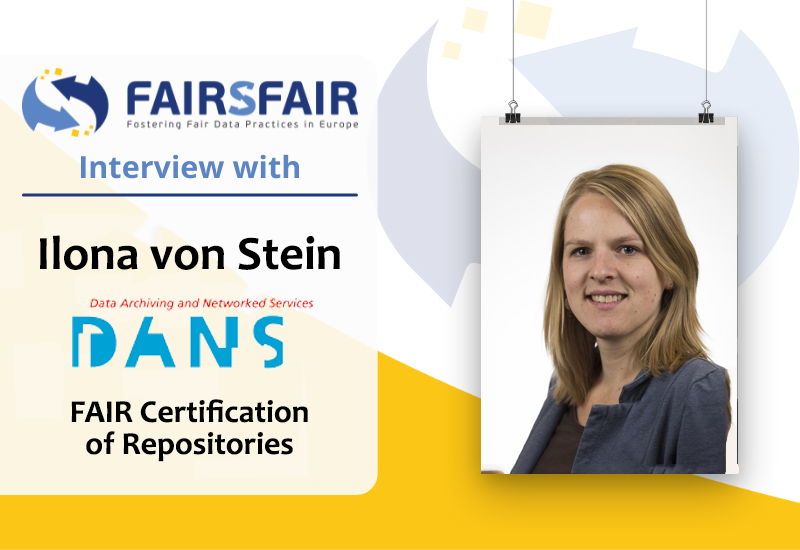Part of a series of interviews with FAIRsFAIR Work Package Leaders
 January 2022
January 2022
Science builds upon the discoveries of its antecedents, therefore, is intrinsically connected to the amount of information that is available and can be reusable to others. This is extremely important during the digital age. Digital platforms that store this data, namely data repositories, need to be organised in a manner that maximses its use and reuse. FAIR principles is a fundamental framework towards that. Increasing the FAIRness of data in FAIR-enabling trustworthy repositories is at the heart of the FAIRsFAIR project.
Ilona, from DANS and Leader of FAIRsFAIR Certification Repository WP, performed a series of actions to support repositories in achieving certification (e.g CoreTrustSeal) by improving the FAIRness of their datasets. Other activities were also put in plac towards this goal.
With FAIRsFAIR reaching the finishing line, Ilona provided us a summary of FAIRsFAIR Certification Team pulled out to support repositories in increasing their data FAIRness
What are the main results pulled out by "FAIRsFAIR Repository Certification Team" and how the community will benefit form them?
There were several activites we put in place, which I believe it makes sense to refer to them one by one:
FAIR DATA ASSESSMENT TOOLS
We have developed a suite of tools for repositories, researchers, data stewards, funders and policy makers. The FAIR-Aware and F-UJI-tool increase awareness on the FAIR principles and focus on improving the FAIRness of dataset. FAIR-Aware provides an online self-assessment tool for researchers and data stewards to assess and increase their knowledge on how to make a dataset FAIR before depositing in a repository. F-UJI is using FAIRsFAIR data metrics to perform automatized assessments. The tool contributes to the verifiability of the FAIRness of research data objects and aims to increase awareness how the FAIRification of data can potentially make data more valuable and impactful.
Both tools have a good potential to become an integral part of the FAIR ecosystem. F-UJI is one of the rare Open Source examples implementing practical data assessments based on FAIR data metrics endorsed by larger parts of the scientific community. It has demonstrated that automatized FAIR assessments are possible which ideally is used in combination with an iterative FAIR consultation process, in order to identify FAIR gaps as well as improvement opportunities. FAIR-Aware has not only had an increased uptake among a large variety of disciplinary satisfied users, and developed additional functionalities to serve the needs of its users (e.g. trainer functionality), it also attracted a broad user community that is eager to contribute and improve the tool.
FAIR-ENABLING REPOSITORY PRACTICES
We have also developed an in-depth tailored repository support programme for repositories on their way towards becoming more FAIR-enabling and trustworthy. A repository can use different mechanisms to assess their trustworthiness; pursuing repository certification is commonly used. We have supported 10 repositories towards CoreTrustSeal repository certification and provided them with tools and services such as practical training materials, 1:1 support and advice, CoreTrustSeal test peer-reviews and peer-community support. The support was mutual, the repositories shared with us their valuable knowledge on repository practices best enable FAIR data. This helped us in providing repositories with a CoreTrustSeal+FAIRenabling Capability Maturity approach for repositories to be able to self-assess a CoreTrustSeal certified repository that enables data FAIRness. The added value of this, for all, for a wider repository audience is that the value of digital assets is maintained in trustworthy digital repositories (TDR) enabling the deposit, curation and preservation of data that is FAIR for the long term.
FAIR-ENABLING REPOSITORY FINDER
In order to increase the visibility of repositories to its users we have integrated the Repository Finder into DataCite Commons. This allows researchers to identify FAIR-enabling repositories to either deposit their research data or find research output, organizations or researchers related to the repository. This new service will be launched at the end of February 2022.

